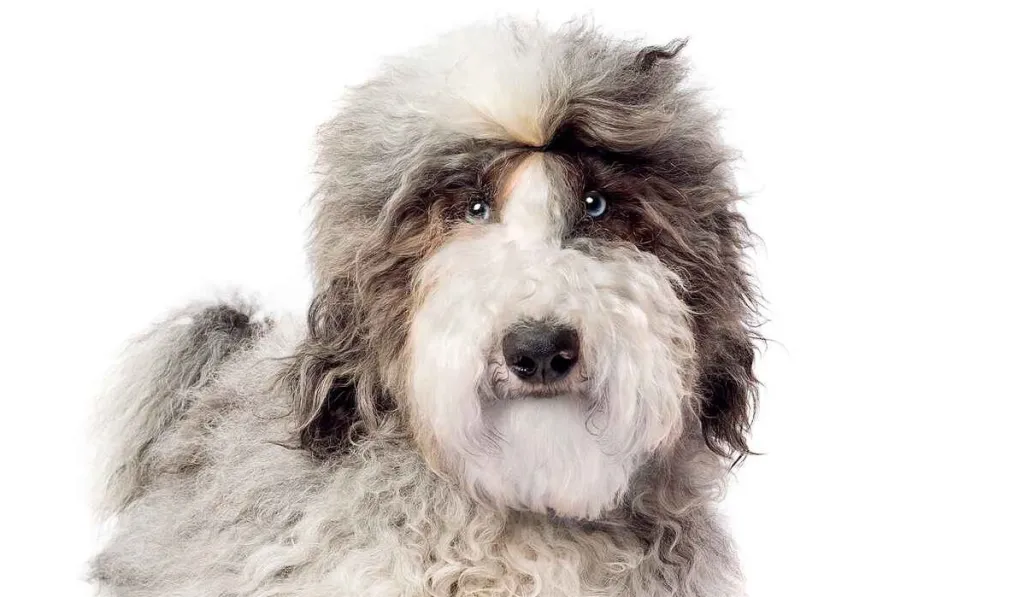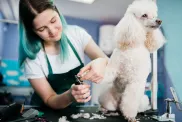The Sheepadoodle is a medium-to-large-sized cross between the Old English Sheepdog and Poodle dog breeds known for their smart, playful, and loving personalities. Sheepadoodles go by many names, including Sheep-a-poo, Sheeppoo, Sheepdoodle, Sheepdogpoo, and Sheepdog Poodle Mix. Despite their status as a designer breed, you may find these mixed breed dogs in shelters and rescues, so remember to adopt.
Because of their hypoallergenic coats, Sheepadoodles are often a great choice for allergy sufferers or those hoping to avoid the extra fur in the house. Beyond this perk, they make great family dogs and companions for single-person households. Due to their natural ability to read human emotions paired with an easygoing temperament, Sheepadoodles often serve as therapy or service dogs. Like other Doodle hybrid breeds, the Sheepdog Poodle mix can be prone to hyperactivity and requires plenty of training and socialization to ensure they grow up well-adjusted.
Sheepadoodle characteristics
- Height: 16 to 22 inches at the shoulder
- Weight: 60 to 80 pounds
- Lifespan: 12 to 15 years
Coat and color variations
Because the Sheepadoodle is a cross between an Old English Sheepdog and a Poodle, their coat and color variations can be quite diverse. The coat is typically soft, curly, or wavy, inheriting the hypoallergenic properties of the Poodle, making it low-shedding and ideal for those with allergies. Sheepadoodle coats can come in various colors, including black, white, gray, or a combination of these colors in patches or patterns. The most common color pattern is black and white but can also be solid black, gray, or sometimes brown. As they mature, their coat color may fade slightly, particularly if they inherit more traits from the Poodle side.
Physical traits and appearance
- Coat texture: Curly, wavy, or straight, soft, and dense
- Color: Black, white, gray, brown, or a mix of these
- Ears: Floppy and set high on the head
- Eyes: Brown or blue, often expressive and round
- Body: Sturdy and well-proportioned with a broad chest
- Tail: Can vary from long and bushy to short (sometimes docked)
- Nose: Black, occasionally pink or lighter spots in multi-colored coats
How big does a Sheepadoodle get?
The size of a Sheepadoodle can vary based on whether the Poodle parent was a standard, miniature, or toy Poodle. Standard Sheepadoodles typically range from 50 to 80 pounds and stand about 18 to 27 inches tall at the shoulder. Miniature Sheepadoodles, from smaller Poodle parents, usually weigh between 25 to 45 pounds and stand 15 to 20 inches tall. Toy variations are rare but exist, and they weigh around 10 to 24 pounds with a height of 10 to 14 inches.
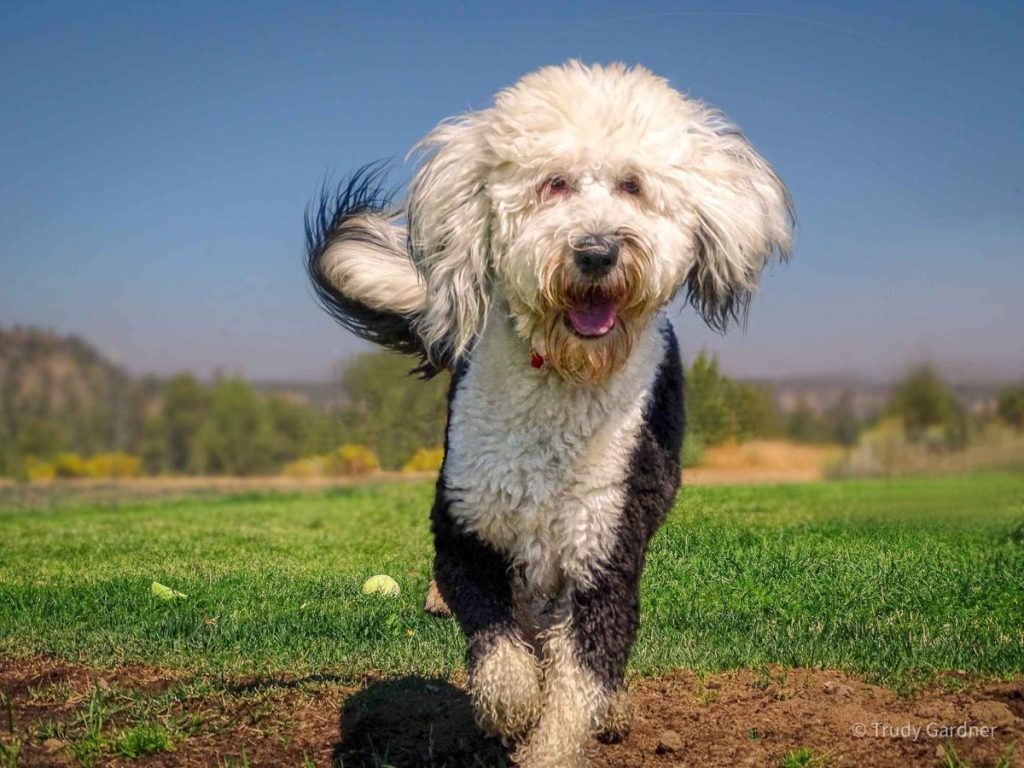
Sheepadoodle history
The Sheepadoodle mixed dog breed may have existed naturally over the years, but it’s believed that this crossbreed gained popularity in the 1980s because they could usually be tolerated well among allergy sufferers. Breeders wanted to mix the two parent breeds to create a large, low-shedding dog that was an excellent companion animal, as well as a great family pet who loves children and will guard their owner’s home.
Even though the Sheepadoodle got their start as a designer breed, some have ended up in shelters or the care of rescue groups. Consider adoption if you decide this is the right mixed breed for you. Check your local shelters, look up Sheepadoodle rescues, or check with breed-specific Poodle or Old English Sheepdog rescues, as they sometimes take in mixed breed dogs and find homes for them.
Sheepadoodle personality
Sheepadoodles are known for their friendly, intelligent, and affectionate personality. They inherit the best traits from both parent breeds: the Old English Sheepdog’s gentle, protective nature and the Poodle’s sharp intelligence and playful energy. Sheepadoodles tend to be highly social and thrive on human interaction, often forming strong bonds with their families. They are also very adaptable and can fit into various living environments, provided they get enough exercise. Their intelligence makes them quick learners, although they may sometimes exhibit stubbornness, especially if they inherit more Sheepdog traits. Despite their size, they often consider themselves lap dogs and love being close to their humans. Sheepadoodles are also known for their playful nature, and their clownish antics can keep families entertained.
Temperament and behavior
- Highly social: Enjoy being around people and other pets
- Affectionate: Bond deeply with their families and enjoy cuddling
- Intelligent: Quick learners, excel in training.
- Playful: Love engaging in fun activities and games
- Energetic: Need regular physical and mental stimulation
- Protective: Can be watchful and alert, especially with children
- Gentle: Great with children and can be quite calm indoors
- Occasionally stubborn: May show independence, particularly with Old English Sheepdog traits
Training and socialization
Early socialization and positive reinforcement training are crucial due to their intelligence and potential stubbornness. Of course, their intelligence allows them to pick up commands quickly, so early training is key to establishing good behavior from the start. Use praise, treats, and affection to reward desired behavior. Sheepadoodles respond well to positive reinforcement, and this approach will keep them motivated and engaged.
Training tips:
- Be Consistent: Consistency is crucial in training. Use the same commands and routines to avoid confusion. This helps your Sheepadoodle understand what is expected of them.
- Keep Training Sessions Short and Fun: Sheepadoodles are intelligent but can lose interest if training sessions are too long or repetitive. Keep sessions short (10-15 minutes) and engage with varied activities.
- Mental Stimulation: Incorporate puzzle toys, obedience training, and interactive games into their routine to challenge their mind. A bored Sheepadoodle can become restless or destructive. Once basic obedience is established, teach more advanced commands or tricks. Their intelligence makes them excellent candidates for agility training, fetch, or scent games.
Sheepaoodle care
Caring for a Sheepadoodle involves meeting their physical, mental, and emotional needs to ensure they thrive. These dogs require regular exercise due to their energetic nature, so daily walks, play sessions, and mental stimulation are crucial. Additionally, Sheepadoodles need social interaction and thrive in environments where they receive ample attention and affection. Veterinary checkups, vaccinations, and parasite prevention should be a regular part of their care routine to ensure long-term well-being.
Sheepadoodle grooming needs
Due to their low-shedding, curly, or wavy coats, Sheepadoodles require regular grooming to keep their fur healthy and tangle-free. Their coat type, inherited from both Poodles and Old English Sheepdogs, tends to mat if not properly maintained. Regular brushing, bathing, and occasional trims are necessary to prevent mats and maintain a clean, healthy coat. Sheepadoodles are also prone to ear infections due to their floppy ears, so ear care should be part of the grooming routine.
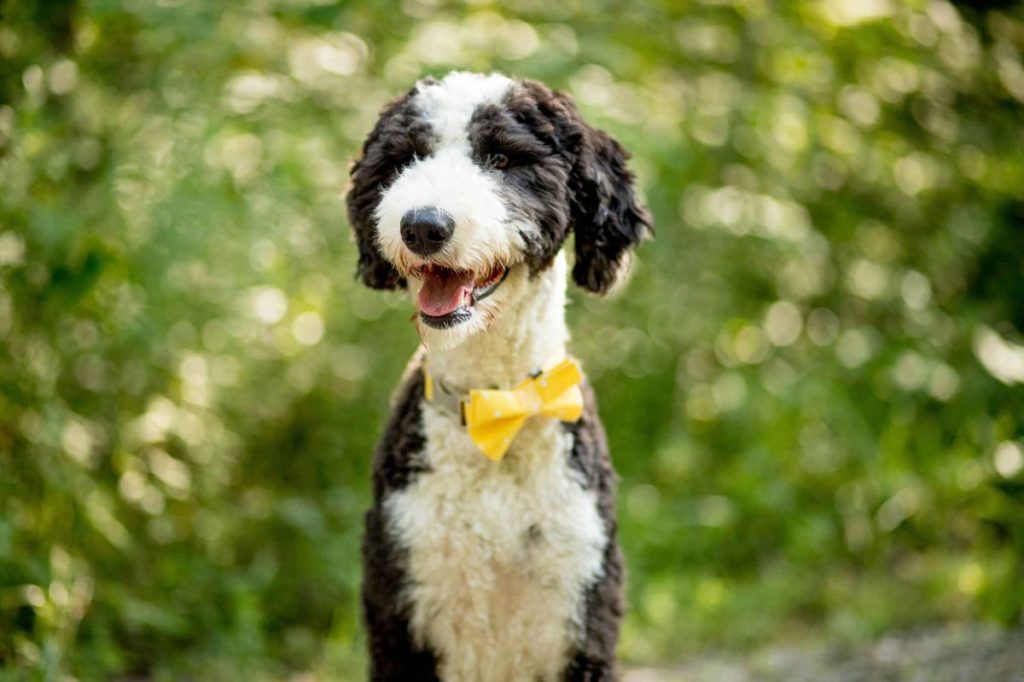
Coat care
Brushing:
- Frequency: Brush your Sheepadoodle 2-3 times per week to prevent matting, especially because both parent breeds are known for their fluffy coats that may be prone to tangles.
- Tools: Use a slicker brush or pin brush for their curly coat, and a comb to detangle any knots.
- Tip: Pay extra attention to areas that are prone to matting, like behind the ears, under the legs, and around the collar.
Bathing:
- Frequency: Bathe your Sheepadoodle every 4-6 weeks or as needed. Frequent baths can dry out their skin, so stick to a gentle dog shampoo.
- Drying: After a bath, towel-dry and use a blow dryer on a low, cool setting if necessary. Make sure their coat is fully dry to prevent any moisture from causing irritation.
Trimming:
- Professional Grooming: Consider having your Sheepadoodle professionally groomed every 6-8 weeks. Groomers can shape the coat, keep it manageable, and trim around sensitive areas like the paws, face, and tail.
- Home Trimming: You can trim their coat at home using dog clippers or scissors for a tidy appearance, especially around the eyes and paws to avoid irritation.
Ear care
- Check for Dirt and Moisture: Sheepadoodles can be prone to ear infections due to their floppy ears. Check their ears weekly for signs of dirt, wax buildup, or moisture, which can lead to infections.
- Cleaning: Clean their ears with a veterinary-approved ear cleaner and a cotton ball or pad. Avoid using cotton swabs, as they can push debris further into the ear.
Nail trimming
- Frequency: Trim your Sheepadoodle’s nails every 4-6 weeks, depending on their activity level. Active dogs may naturally wear down their nails, but indoor or less active dogs will need more frequent trims.
- Tip: Use a dog nail clipper or a grinder. Be careful not to cut too far down, as hitting the quick (the blood vessel inside the nail) can be painful and cause bleeding.
Dental and eye care
- Brush Regularly: Brush your Sheepadoodle’s teeth 2-3 times per week using a dog-specific toothbrush and toothpaste. This helps prevent plaque buildup and dental issues.
- Dental Chews: Provide dental chews or toys to help reduce plaque and keep their teeth healthy.
- Clean Around the Eyes: If your Sheepadoodle’s coat grows around their eyes, regularly trim the hair to prevent irritation. Use a clean, damp cloth to gently wipe away any eye discharge or tear stains.
Check for skin issues
- Inspect Regularly: As you groom, check their skin for any signs of irritation, redness, or bumps. If you notice anything unusual, consult a vet.
Flea, tick, and parasite control
Keep up with flea and tick prevention treatments, especially if your Borderdoodle spends much time outdoors. Regular grooming allows you to spot parasites early.
Early acclimation is key
Getting your Sheepadoodle accustomed to grooming procedures from a young age makes the process easier and more enjoyable for both of you. Handle their paws frequently, examine their mouth and ears, and reward them for good behavior during grooming sessions. This positive foundation sets the stage for stress-free veterinary exams and handling throughout their lives.
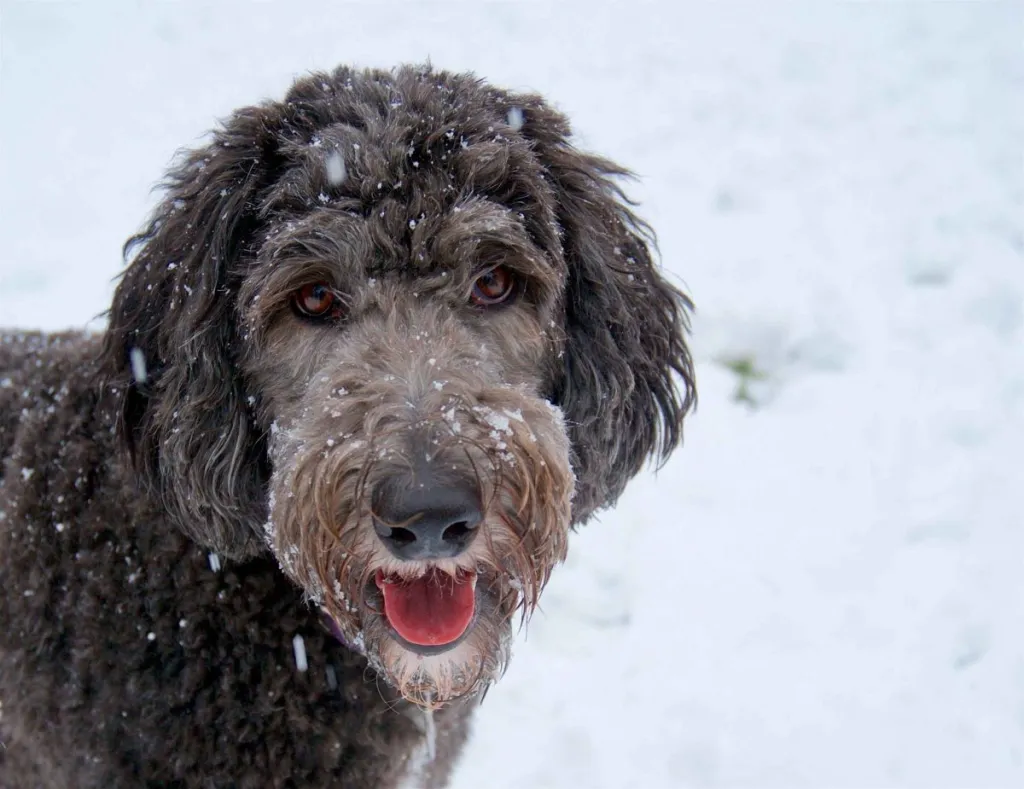
Feeding and nutrition
An ideal Sheepadoodle diet should be formulated for a medium-to-large-sized breed with medium energy. Sheepadoodles need to stick to a healthy diet, as overeating can cause weight gain and associated health problems, especially if adequate exercise isn’t offered.
As with all dogs, the Sheepadoodle’s dietary needs will change from puppyhood to adulthood and will continue to change into their senior years. You should ask your veterinarian for recommendations about your Sheepadoodle’s diet, as there is far too much variation among individual dogs–including weight, energy, and health–to make a specific recommendation.
- Adult Portions: Feed an adult Sheepadoodle based on their weight, size, and activity level. On average, a medium-sized adult (30-50 lbs) Borderdoodle will need about 2-3 cups of dry food per day. A larger dog (50-60 lbs or more) may need 3-4 cups per day.
- Adjust According to Activity Level: Highly active Sheepadoodles may need more food than less active ones. Always monitor their weight and adjust portions accordingly.
Sheepadoodle and family compatibility
Sheepadoodles are highly compatible with families, making them a popular choice for households with varying lifestyles. Their affectionate and loyal nature means they quickly form strong bonds with all family members, thriving in environments where they receive plenty of attention and companionship. Sheepadoodles are adaptable, getting along well with both active families who enjoy outdoor activities and quieter households as long as their exercise needs are met. Their playful, social nature makes them wonderful companions for families with children, and they also tend to get along well with other pets. Their protective instinct, inherited from the Old English Sheepdog, adds an extra layer of security, making them not only loving but also watchful family members.
Is the Sheepadoodle good with children?
Yes, Sheepadoodles are generally excellent with children. Their gentle and affectionate temperament, combined with a playful, energetic personality, makes them great playmates for kids. They are patient and protective, often watching over children, and their low-shedding, hypoallergenic coat is a bonus for families with allergies. However, as with any dog, early socialization and supervision are key to ensuring harmonious interactions between the Sheepadoodle and younger children.
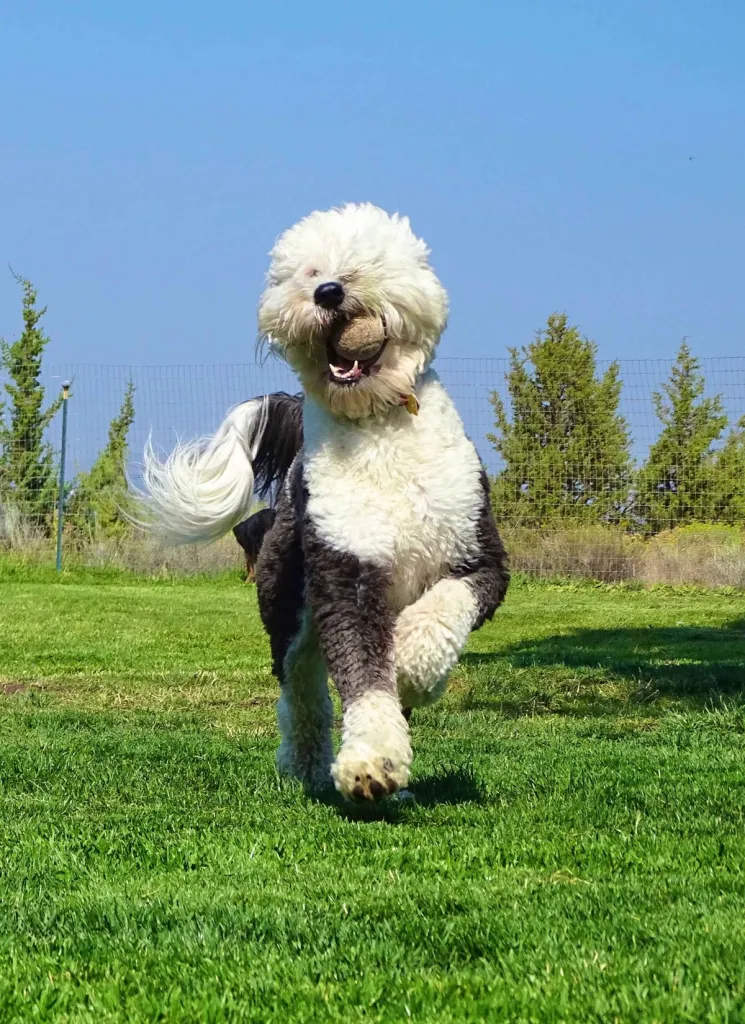
Sheepadoodle health issues
The Sheepadoodle may be a mixed breed, but they are still predisposed to some of the same conditions that the Poodle and Old English Sheepdog face. Some of the more common health problems Sheepadoodles suffer from include:
- Bloat (Gastric Dilatation and Volvulus, GDV): Bloat is a life-threatening condition in dogs where the stomach fills with gas and twists upon itself. This can lead to a rapid expansion of the abdomen, cutting off blood supply, and causing severe pain. Bloat is an emergency and requires immediate veterinary intervention to alleviate the gas buildup and restore proper blood flow.
- Hip Dysplasia: Hip dysplasia is a common orthopedic condition in dogs where the hip joint doesn’t develop properly. It results in a mismatch between the ball and socket of the hip joint, causing pain and discomfort. Hip dysplasia can lead to arthritis and mobility issues. Treatment may include medication, physical therapy, or surgical intervention.
- Addison’s Disease (Hypoadrenocorticism): Addison’s disease is a hormonal disorder in dogs where the adrenal glands don’t produce enough cortisol and aldosterone. This can lead to a range of symptoms, including lethargy, vomiting, diarrhea, and electrolyte imbalances. Treatment involves lifelong hormone replacement therapy to manage the condition.
- Joint Issues: Joint issues in dogs refer to various conditions like arthritis, luxating patella (dislocating kneecap), and cruciate ligament injuries. These conditions result in pain, stiffness, and reduced mobility in the affected joints. Management includes pain medication, physical therapy, and in some cases, surgical intervention.
- Sebaceous Adenitis/Skin Disorders: Sebaceous adenitis is a skin disorder in dogs that affects the sebaceous glands responsible for producing sebum, an essential skin oil. Dogs with this condition may experience hair loss, flaky skin, and dryness. Treatment involves medicated shampoos, supplements, and sometimes topical or oral medications to manage the skin disorder. Other skin disorders in dogs can range from allergies and fungal infections to autoimmune conditions, each requiring specific diagnostic and treatment approaches.

Sheepadoodle rescue groups
It may be hard to find a breed-specific rescue for Sheepadoodles because they are a mixed breed. However, you may want to try Old English Sheepdog or Poodle breed-specific rescues, as they often care for mixes, as well. Here are some rescues you can try:
Finding a reputable dog breeder is one of the most important decisions you will make when bringing a new dog into your life. Reputable breeders are committed to breeding healthy, well-socialized puppies that will make great companions. They will screen their breeding stock for health problems, socialize their puppies from a young age, and provide you with lifetime support.
On the other hand, backyard breeders are more interested in making a profit than in producing healthy, well-adjusted dogs. They may not screen their breeding stock for health problems, and they may not socialize their puppies properly. As a result, puppies from backyard breeders are more likely to have health problems and behavioral issues.
How much does a Sheepadoodle cost?
The cost of a Sheepadoodle can vary widely depending on several factors, including the breeder, location, and the puppy’s lineage (such as whether the parents are show-quality or have health certifications). On average, a Sheepadoodle puppy typically costs between $1,500 and $3,500.
Some breeders may charge more, particularly for mini Sheepadoodles, or if the puppies come from high-quality breeding lines. In addition to the initial purchase price, potential owners should also consider additional costs such as vaccinations, grooming, and general pet care when budgeting for a Sheepadoodle.
